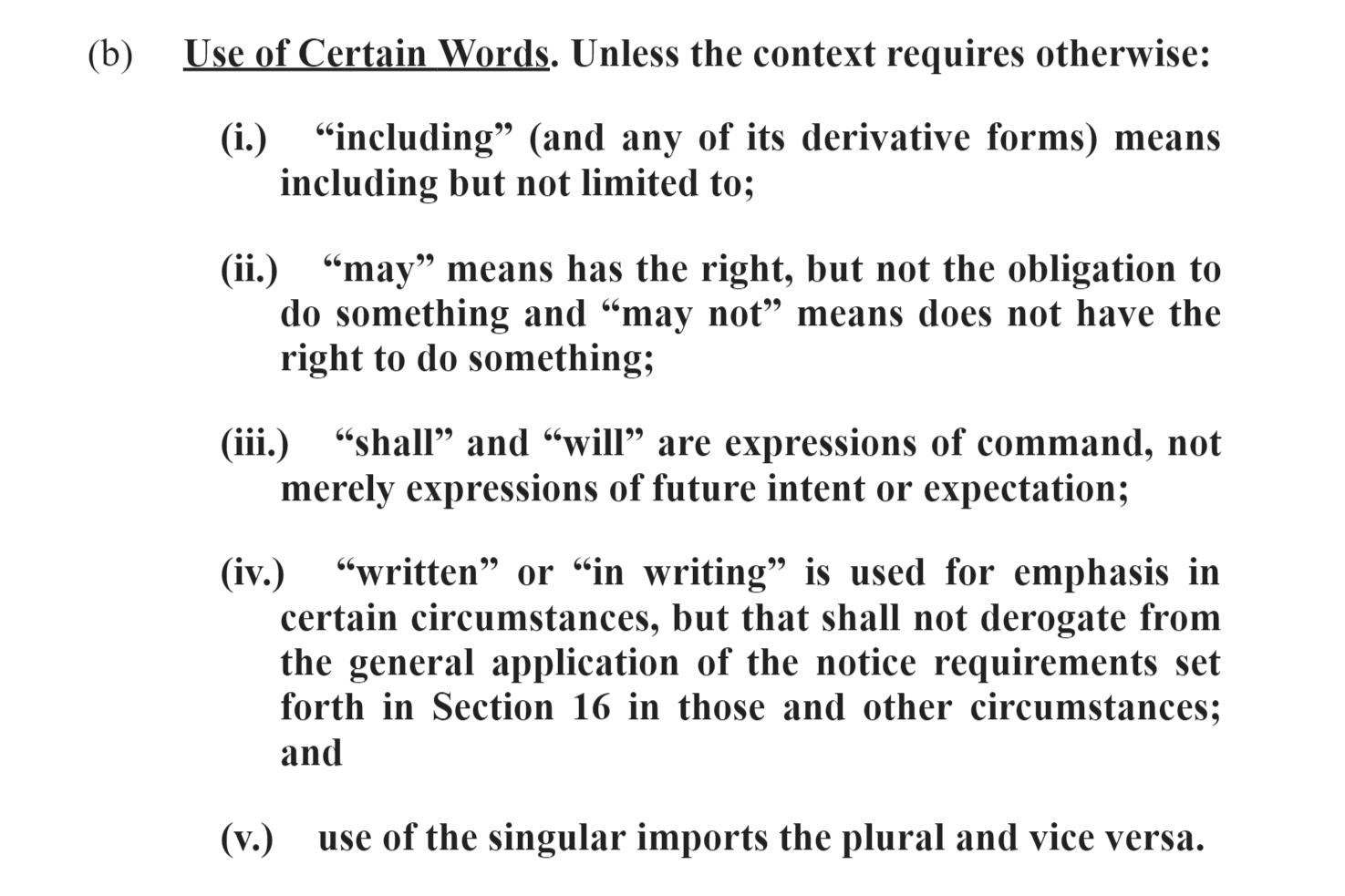I recently had a random Edgar encounter with the following set of internal rules of interpretation:
Welcome to the suck: the first, second, third, and fifth are hopeless. And dig that crazy period-and-parentheses enumeration combo.
But the fourth is what caught my eye. So the notices provision says that notices must be in writing to be effective, but elsewhere we’re going to sporadically say written notices or notices in writing, just to remind the other side that, yes, notices have to be in writing. Otherwise, a reader might consider a given provision in isolation and attempt to give notice by phone or in a face-to-face conversation.
I think that internal rule of interpretation is a bad idea, for two reasons.
First, saying in the deal terms that notices have to be in writing is redundant, given what the notices provision says. You should never say the same thing twice in a contract, and one reason for that is implicated here: it adds unnecessary words. I suggest that fear that the other side might try to give notice orally isn’t worth eliminating the in-writing requirement in the notices provision in favor of adding it to each deal-term reference to giving notice.
And second, if you add the in-writing requirement to just some of the deal-term references to giving notice, you’re being inconsistent. That’s too is something you should never do in a contract. It suggests that the writing requirement is more important for some kinds of notice than for others, so maybe the in-writing requirement isn’t really necessary for those other kinds of notice. If you send those sorts of mixed signals in a contract, don’t be surprised if a court opts for one scenario over the other.
So the fourth rule of interpretation joins the others on the scrapheap.
(By the way, A Manual of Style for Contract Drafting deals contains a short chapter on internal rules of interpretation. But it’s perhaps the least compelling chapter in the book. That’s because most internal rules of interpretation state the obvious, make no sense, or are unrealistic in trying to tell courts what to do.)


Let’s look at the first, second, third, and fifth, too:
1/ ‘Use of certain words’: a nice umbrella caption for a combination of definitions and other rules of interpretation. There, I’ve said something nice and got that out of the way.
2/ ‘Unless the context requires otherwise’: Risky. Means every use of the ‘certain words’ requires scouring the ‘context’ to see whether the rule applies.
3/ ‘Including’: ‘But not limited to’ doesn’t solve the problems of ‘including’, to wit, exhaustion, ejusdem generis, and noscitur a sociis.
4/ ‘May’: ‘right without obligation’ doesn’t capture discretion correctly. Under ‘right without obligation’, does ‘Acme may paint the houses with blue paint if the red paint runs out’ imply that Acme has no duty to paint further if the red paint runs out?
5/ ‘May not’: Unless that’s meant to be a prohibition, it draws a weird distinction between ‘lacks the right’ and ‘takes on a duty not to’ (shall not). If it does mean to prohibit, ‘shall not’ is the better choice.
6/ ‘Shall’: MSCD doesn’t think it needs definition, but if it were defined, a good one would be ‘hereby [ie, by making this agreement] takes on a duty to’.
7/ ‘Will’: ‘The whistle will signal the start of the work day’ is not an expression of command. MSCD recommends the proper use of ‘will’ and doesn’t recommend defining the word.
8/ ‘Written’ etc.: I understand the temptation to emphasize the writing requirement in certain places, but the temptation should be squelched, for the reasons you state. If for some reason the emphasis is essential, the least risk lies in this approach: ‘Any notice under this section 42 must be in writing, like all other notices subject to the notice requirements in section 16’. But I can’t imagine a need for it.
9/ Singular/plural: I confess I don’t see the objection to (v.). Incompleteness? Doesn’t deal with masculine/feminine/neuter?